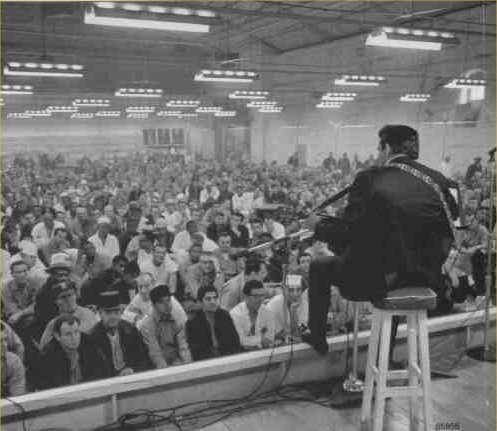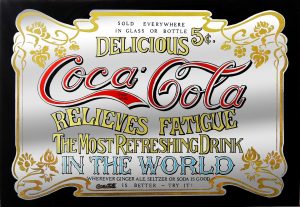“Hello, I’m Johnny Cash.” These famous words once echoed within the walls of a prison that earned its fame through a song. The performance, though, was much more that just a set of lyrics or a nice tune. On January 13, 1968 at the beginning of what would become a tumultuous year, Johnny Cash, June Carter, Carl Perkins and the Tennessee Three performed two shows at Folsom Prison in California. These performances would forever change the landscape of music, reaching Time Magazine’s 100 top albums of all-time in 2006, while also raising awareness for prison reform by putting it into the spotlight.1
Before this performance, Johnny Cash and his health were in a downward spiral. His song “Folsom Prison Blues” was inspired by the film “Inside the Walls of Folsom Prison” in which he saw himself as a prisoner at Folsom. This song caused many of the inmates and people around the United States to believe that he was once incarcerated at Folsom Prison. This was not true, although Mr. Cash had spent a few nights in other jails for drunk and disorderly conduct and possession of drugs. This led many to believe that because of this, Cash’s music and performances resonated with deeply with prisoners.2
The Civil Rights Movement brought attention to prison reform, and Cash’s home state of Arkansas was one of the worst offenders of these kinds of abuses. Their ineffective treatment and rehabilitation of their inmates, along with poor living conditions made him empathize with the men. He decided to use his social and celebrity status he decided to spark a change.His dependence on drugs at the time made Columbia Records unwilling to record a live performance at the prison. But in 1967 both Cash and Columbia Records underwent major changes, and when Bob Johnston was put in charge of Cash’s musical performances, Folsom Prison was a go.3

The performance was set for January 13, 1968, so the band and Cash’s father arrived three days earlier to rehearse the carefully crafted lineup of songs. While at El Rancho Motel in Sacramento, California, the Governor of California Ronald Reagan, who was there for an after-dinner speech, visited the band and offered his words of encouragement.4 The night before the performance, Cash stayed up late rehearsing a song written by inmate Glenn Shirley called “Greystone Chapel,” which was about finding God in the chapel at Folsom Prison. Moved by the lyrics “Inside the walls of prison my body may be/But the Lord has set my soul free.” Mr. Cash vowed to play the song the next day. 5
On the morning of January 13, Mr. Cash met with Los Angeles Times writer Robert Hilburn (who later wrote the biography Johnny Cash: The Life) and photographer Jim Marshall at Folsom Prison where things were tense. A guard had recently been taken hostage, and so the inmates were told not to stand during the show. Armed guards carefully watching the crowd from above, but apart from all the chaos stood a calm man dressed in all black. When he took the stage for his first performance out of two that day, the inmates were told not to cheer until he had introduced himself, and they listened. His first song on the list, Folsom Prison Blues, sent the crowd into an uproar and the entire event was a huge success.6

Four months after the performance, the album At Folsom Prison was released. More importantly was the success that came with it, which allowed Cash to speak more about the reform needed in prisons. “He thought the prison system was broken, it wasn’t fixing anybody,” said Mark Stielper, a friend of Cash’s and the family’s designated historian. “The population was mixed, kids and killers. This was his thing; he was really bothered by that.”7 With no other celebrity making society aware of those issues at the time Mr. Cash brought major spotlight, and as a result he was invited by Senator William E. Brock III (R-Tenn.) in July 1972 to testify before the Senate Judiciary Committee’s subcommittee on national penitentiaries. During the same visit Cash met with President Richard M. Nixon in the Oval Office to further discuss the issue. After these important meetings he continued to perform at other prisons, Mr. Cash also spoke about the issue at concerts and on his TV program, and would also visit inmates at his home in Tennessee to play cards and socialize with them. 8
On top of all the musical success was a nation who did not support the cause of prison form enough, and so no traction was really gained from Cash’s advocacy. The performance though, left a lasting effect on country music and solidified Johnny Cash as someone who stood up for those who are often misunderstood and needed help, mirroring his own personal life in a special way.
“So my intuitive take on the time around Folsom is paradoxical, given what the subject matter was: It was the moment that he came into the light. It’s a paradox, but it’s true. When I think about my dad’s life and I think about that moment, that’s when there’s a kind of force, when he embodied who he really was. And that’s light, no matter how much darkness is in it.”
-Rosanne Cash, daughter of Johnny Cash.9
Video interviews made by Northern Light. | Courtesy of YouTube
- Wikipedia, 2018, s.v. “At Folsom Prison,” https://en.wikipedia.org/wiki/At_Folsom_Prison. ↵
- Allison Stewart, “At Folsom prison, Johnny Cash found his cause,” The Washington Post, May 29, 2018, Accessed September 7, 2018, https://www.washingtonpost.com/national/at-folsom-prison-johnny-cash-found-his-cause/2018/05/28/740124ca-4f03-11e8-84a0-458a1aa9ac0a_story.html?noredirect=on&utm_term=.1974f5815d36. ↵
- Colin Woodward, “The Arkansas prison scandal,” March 22, 2018, https://www.arktimes.com/arkansas/the-arkansas-prison-scandal/Content?oid=15957051. ↵
- The Encyclopedia of World Biography, 2nd ed., vol. 3, 2004, s.v. “Johnny Cash,” 353-355. ↵
- Allison Stewart, “At Folsom prison, Johnny Cash found his cause,” The Washington Post, May 29, 2018, Accessed September 7, 2018. ↵
- Robert Hilburn, Johnny Cash: The Life (New York: Little, Brown, and Company, 2013) 325-327. ↵
- Danny Robins, “Johnny Cash and his prison reform campaign,” BBC World Service, Arkansas, January 23, 2013, https://www.bbc.com/news/magazine-21084323. ↵
- Allison Stewart, “At Folsom prison, Johnny Cash found his cause,” The Washington Post, May 29, 2018, Accessed September 7, 2018. ↵
- Michael Streissguth, Johnny Cash’s ‘At Folsom Prison’: Rosanne Cash Recalls Iconic Live Album, January 12, 2018, https://www.rollingstone.com/music/music-country/johnny-cashs-at-folsom-prison-rosanne-cash-recalls-iconic-live-album-204100/. ↵



67 comments
Robert Colwell
This was an amazing article. Up until now, I actually thought that Cash was incarcerated at Folsom Prison due to the point of view in his song. It is really cool to learn about the history behind his visits to Folsom and how it impacted prison reform during the Civil Rights Movement. The album that came out of his trips to Folsom Prison is one of my favorites of all time, and this article really heled me appreciate the meaning behind it.
Sophia Rodriguez
I never knew the meaning behind Folsom Prison and now that I do I appreciate the song more than I did before. I had watched a movie about Johnny Cash and I learned how rough his life was and his battle with drugs. I thought it was good for him to use his status to make an effort to try to bring awareness of the prison system being able to try to make a change. I thought this was a good article to read overall and it was good to learn more information about this artist.
Nicholas Burch
I think it’s awesome how Johnny Cash was able to embrace who he was along with all the problems he had in the past. He used music to resonate with his life experience to prison inmates all over the world. You could only imagine the positive impact this had on prisoners, especially those in Folsom Prison. Most people would turn a blind eye to prison reform, but Johnny Cash was the exception who helped in the best way he knew. While struggling with his own demons, he brought hope to everybody else through his positive musical influence.
Yuliana Vasquez
I actually learned something new while reading this, I didn’t even know that was the meaning behind the song. I actually watched the Johnny cash movie, so it was interesting to know a deeper meaning of that scene. During that scene, it had a lot of impact since he plays with a lot emotion in that scene, but now to know that he did it to make a change is pretty cool.
Kenneth Gilley
What an interesting article! I was quite surprised to find out that Johnny Cash had been in jail before for drunk and disorderly conduct and possession of drugs. Perhaps it contributed to his impressive ability to connect with his audience at Folsom Prison. He saw many problems with the prison system and worked hard to bring about public awareness of those problems.
Addie Piatz
My dad and I have always been really big fans of Johnny cash and his music. It did make me sad when i found out that he was involved with drugs as a kid because he was someone i looked up to and sang with in the car. However, as I found out over time in school that drugs was a big thing in his time period I was more understanding. After reading this article, I have so much respect for him and how well he handled his time in prison.
Courtney Pena
I like listening to Johnny Cash and one of my favorite songs is Ring of Fire. I was able to learn some new things from the article about Cash. I did not know that he spent a few nights in jails for drunk and disorderly conduct and possession of drugs. I thought that it was interesting how he created music about jail. At least his music left an impact on people.
Jacqueline Mendez
Very well done article. Johnny Cash is such a famous and well-known name. My mother loves him and I’m going to tell her this story about him. I have never been into Johnny Cash but found this article very cool and had a lot of information! I kinda want to start listening to his music and get on that band-wagon. Overall very good article!
Mia Correa
Okay, first off. I absolutely LOVE Johnny Cash. I grew up listening to Ring Of Fire and Folsom Prison Blues, which in my opinion, are Johnny Cash’s two most well known/ most popular hit songs. The fact that Johnny was able to create such catchy music despite all of his hardships is really cool and I admire that. Like most celebrities, he went through an addiction, but unlike most celebrities, he create music about jail! Although, he only ever stayed in jail for one night at a time. He did go seven times though.
Victoria Davis
Many people were able to benefit from Johnny Cash’s music. He was so unique and stuck to his beliefs. Incorporating his daughter and setting examples really brought this article to a deeper level. This article really had me interested in it from the start and was very well written. It included many details that made the story connect to everyone in some sort of personal way. He has my respect.